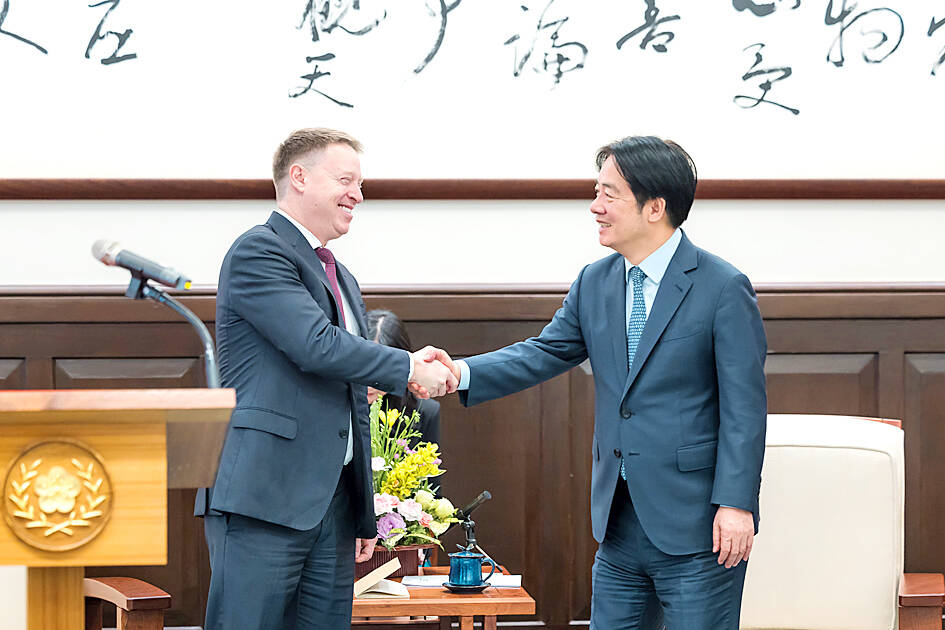Taiwan hopes to strengthen cooperation with the US in critical technologies and innovations to jointly build a safe and resilient “non-red supply chain,” President William Lai (賴清德) said yesterday.
Lai made the remarks at a meeting with former US deputy national security adviser Matt Pottinger and retired US rear admiral Mark Montgomery at the Presidential Office in Taipei.
“Increased cooperation between authoritarian countries is posing risks and challenges to the geopolitical landscape and regional security,” Lai said. “Only by bolstering our defense capabilities can we demonstrate effective deterrence and maintain peace and stability across the Taiwan Strait and around the world.”

Photo: Screen grab from the Presidential Office’s Flickr page
“Taiwan will continue to improve its self-defense capabilities. We also hope to strengthen the Taiwan-US partnership in such fields as security, trade and the economy, and energy,” he said.
“In addition, we will advance cooperation in critical and innovative technologies and jointly build secure and resilient non-red supply chains. This will ensure that Taiwan, the US and democratic partners around the world maintain a technological lead,” he said.
“We believe that closer Taiwan-US exchanges and cooperation not only benefit national security and development, but also align with the common economic interests of Taiwan and the US,” he said.
The president also welcomed and thanked Pottinger and Montgomery for visiting Taiwan again, and continuing to enhance exchanges between the two nations and to show their firm support for the nation.
Lai said Pottinger and former US National Security Council official Ivan Kanapathy visited him in June last year and gave him a book they coauthored — The Boiling Moat: Urgent Steps to Defend Taiwan — as well as shared many ideas on Taiwan-US relations and regional issues.
The traditional Chinese character translation of the book would be published in Taiwan soon, Lai said, adding that he believes readers in Taiwan would benefit a lot from the valuable ideas in the book.
The Presidential Office quoted Pottinger as saying that Lai’s announcement about Taiwan aiming to increase defense spending to above 3 percent of its GDP is a good move to increase Taiwan and the US’ joint deterrence.
Echoing Lai’s remark that “peace is achieved through strength,” Pottinger said he believes this is the correct direction for Taiwan and the US, at a time when autocratic and aggressive governments are rising, it said.
Quoting former US president George Washington, Pottinger said: “To be prepared for war is one of the most effective means of preserving peace.”
That explains the meaning of “peace through strength,” he said, adding that he was looking forward to exchanging ideas on the issue with Lai.

MORE VISITORS: The Tourism Administration said that it is seeing positive prospects in its efforts to expand the tourism market in North America and Europe Taiwan has been ranked as the cheapest place in the world to travel to this year, based on a list recommended by NerdWallet. The San Francisco-based personal finance company said that Taiwan topped the list of 16 nations it chose for budget travelers because US tourists do not need visas and travelers can easily have a good meal for less than US$10. A bus ride in Taipei costs just under US$0.50, while subway rides start at US$0.60, the firm said, adding that public transportation in Taiwan is easy to navigate. The firm also called Taiwan a “food lover’s paradise,” citing inexpensive breakfast stalls

TRADE: A mandatory declaration of origin for manufactured goods bound for the US is to take effect on May 7 to block China from exploiting Taiwan’s trade channels All products manufactured in Taiwan and exported to the US must include a signed declaration of origin starting on May 7, the Bureau of Foreign Trade announced yesterday. US President Donald Trump on April 2 imposed a 32 percent tariff on imports from Taiwan, but one week later announced a 90-day pause on its implementation. However, a universal 10 percent tariff was immediately applied to most imports from around the world. On April 12, the Trump administration further exempted computers, smartphones and semiconductors from the new tariffs. In response, President William Lai’s (賴清德) administration has introduced a series of countermeasures to support affected

CROSS-STRAIT: The vast majority of Taiwanese support maintaining the ‘status quo,’ while concern is rising about Beijing’s influence operations More than eight out of 10 Taiwanese reject Beijing’s “one country, two systems” framework for cross-strait relations, according to a survey released by the Mainland Affairs Council (MAC) on Thursday. The MAC’s latest quarterly survey found that 84.4 percent of respondents opposed Beijing’s “one country, two systems” formula for handling cross-strait relations — a figure consistent with past polling. Over the past three years, opposition to the framework has remained high, ranging from a low of 83.6 percent in April 2023 to a peak of 89.6 percent in April last year. In the most recent poll, 82.5 percent also rejected China’s

PLUGGING HOLES: The amendments would bring the legislation in line with systems found in other countries such as Japan and the US, Legislator Chen Kuan-ting said Democratic Progressive Party (DPP) Legislator Chen Kuan-ting (陳冠廷) has proposed amending national security legislation amid a spate of espionage cases. Potential gaps in security vetting procedures for personnel with access to sensitive information prompted him to propose the amendments, which would introduce changes to Article 14 of the Classified National Security Information Protection Act (國家機密保護法), Chen said yesterday. The proposal, which aims to enhance interagency vetting procedures and reduce the risk of classified information leaks, would establish a comprehensive security clearance system in Taiwan, he said. The amendment would require character and loyalty checks for civil servants and intelligence personnel prior to